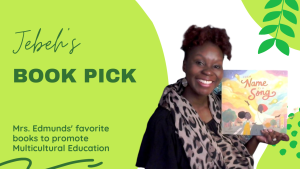This book is amazing. It is a love between a mother and her daughter on her first day of school. And I have to tell you, I can relate to this little girl because she gets picked up from school by her mother. And she is upset. Is she mad and frustrated because of how her teacher made her feel about her name? She told her mommy she choked when she said my name, and the other kids in my class chuckled. I was that little girl. And I remember the day my mom picked me up, and I had that experience. Now my mom is also an educator, and knowing her and my father, when they named me Jebeh, after the chief of our tribe, who was my great aunt Chief Jebeh.
And this book also depicts the same love and confidence that this mother only pays to her daughter. She has it in a lyrical rhythm that your students can tap into the syllables of each name. And the names that the author picked are names spoken throughout the world. Some names are in Arabic. Some names are in Vietnamese, and some names are Nigerian and Ghanaian. Some names are African American. And what I love about this book is that it has a glossary at the back. Before reading this book out loud to your students, I recommend you read the love glossary and practice the names because when you’re reading the book out loud.They’re gonna sit up taller. They’re gonna feel proud. They’re gonna love that their name is actually in this book. Hey, I must admit, the day I have my name written in a book, I am going to fall over with joy. Hopefully, it’ll be a name I wrote myself because I am also a writer. But I want you educators to take this book and read it. Like I said, it will be music to your ears. It is a beautiful, well-written story.
I’m going to share just a couple names in the book that you have to read because once you read it, you can feel the rhythm of The fire the stars. In this story. We have Lamika, Kwaku, Born on Wednesday, and Ghanian names. I have Ta’ Jae, and I also have Ngozi. Have a cousin named Ngozi, Ngozi girl, your name is in this book, she’s gotta love that too. Also, you’ve got names, like I said or done. And you’ve got Ha, that is Vietnamese. Another thing that I want you to see at the end of this book is she shares her name in a song. She is practicing her classmates’ names in a song and how that teacher changes her attitude towards this girl is also very powerful. The name she is in this book is about the little girl. Her name is Kora-Jalimusu. Now the meaning Kora-Jalimusu is after the harp instrument played by a female griot. A griot is a West African storyteller.
Not everybody gets the honor to become a griot in their tribe in the western part of Africa. So for her to have that name of a harp, Kora, the harp is just beautiful. And if it wasn’t for my mother and my father giving me the name of my great aunt, I don’t think I would have felt as strong and important and validated with the identity that I do now. It takes your parents and your community around you to learn your name and understand your identity and take pride in that. And it also depicts the beauty of names that, although you’ve never heard of them or are unfamiliar with these names, names are so beautiful, and they are music to everyone’s ears. So when you’re reading a story the first time, enjoy it, learn from it.
You might not have a student in this book that will go, “oh my goodness, that’s me!” It is beautiful. And I tell you, I cannot wait to meet this author and say thank you to all the children out there. I cannot wait to personally find the author and thinker because I am one of these names in this book, feeling despair at first and discouragement. And then my mother and father brought that pride back into me because I was named for a reason.
My name is also a beautiful song. It is titled Jebeh, written and performed by the African icon Miata Fahnbulleh, so look it up and listen to Jebeh. The melody of the son of Jebeh is owned by son Jebeh, which means my heart is pleased to meet you. I play the song in front of my students every year I have taught. I even played it and performed it in my community. My name is a song. Your name is a song. And we need to have our symphony of names together, united and understood; Jamilah, I hope to meet you one of these days because I am a huge fan of your work. Educators, please get this book on your bookshelves.
Study the glossary for others like myself; you need to learn how to say our names correctly, like Jebeh. I can’t tell you how many times my name was mispronounced by my teachers growing up, and some of them practiced really hard. Some of them didn’t. So please don’t be those who didn’t teach and read this book to your students. I am so excited that I also have a companion lesson plan with this book. So check it out on my website to order the lesson plan and more information on where you can find Your Name is a Song written by Jamilah Thompkins-Bigelow, Illustrated by Luisa Uribe
